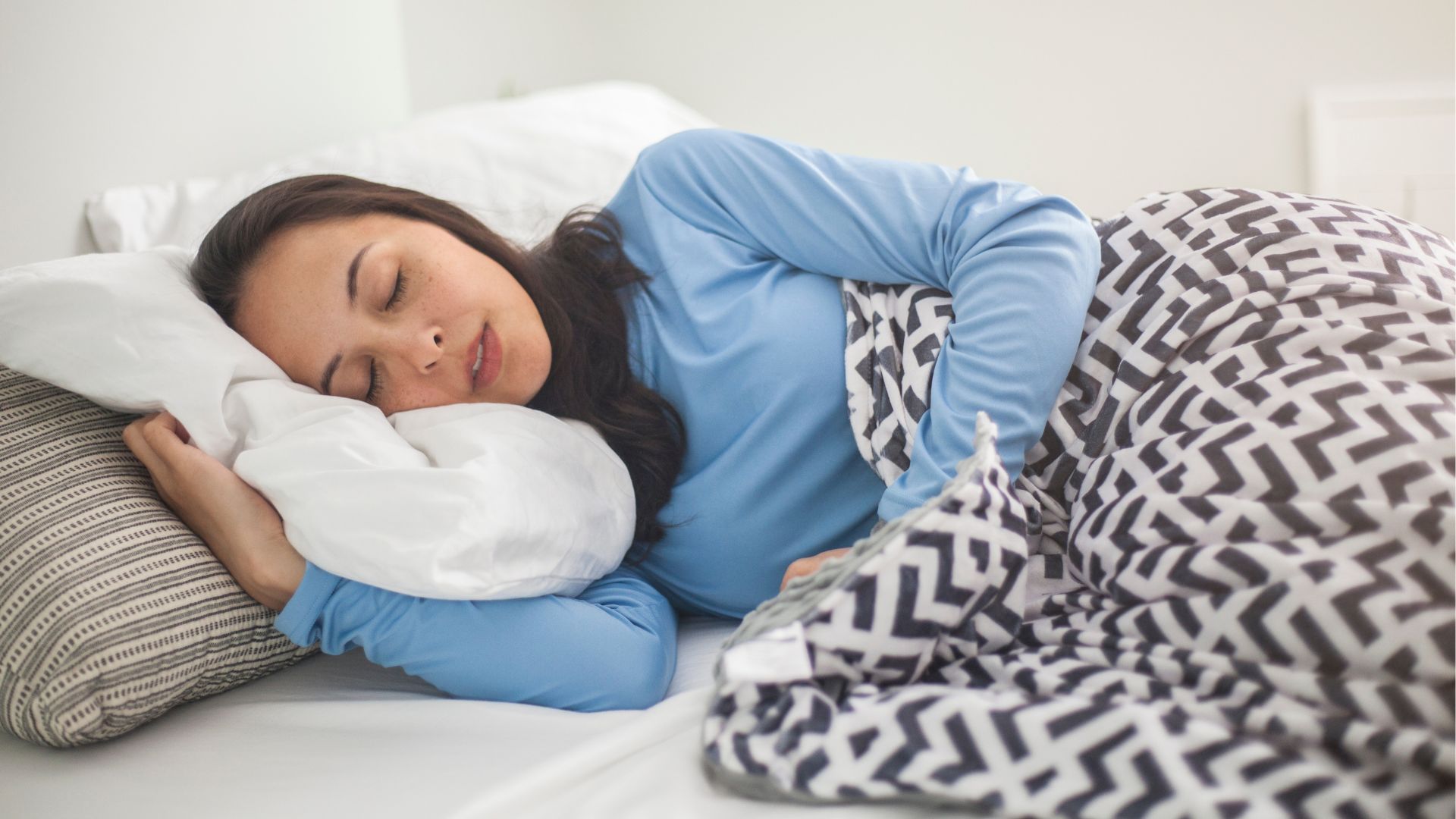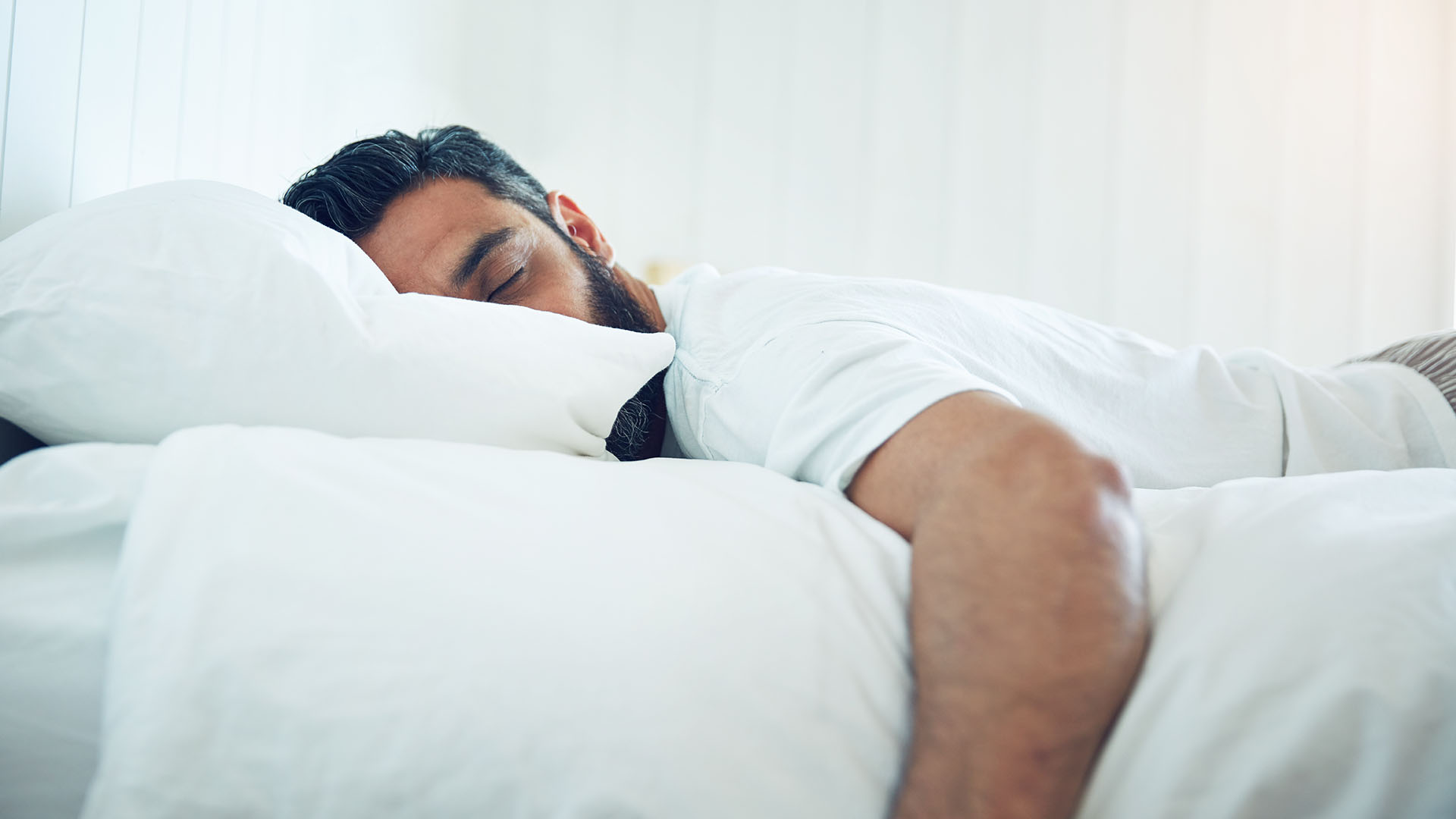Does sleeping on your stomach cause back pain? A chiropractor responds
Sleeping on your stomach places your back and neck under strain — here's how to stop

Your sleeping position plays a big role in how you feel in the morning. And if you’re a stomach sleeper, you might be more likely to experience back pain the next day—or down the line—even if you’re getting a good night’s sleep on one of the best mattresses.
Stomach sleeping can put your spine in awkward positions that can cause twisting and increased pressure on spinal joints, says Kevin Lees, D.C., Director of Chiropractic Operations, from The Joint Chiropractic, a provider of chiropractic care based in Scottsdale, AZ. The neck needs to be turned to one side or the other to facilitate proper breathing while on your stomach. “Keeping your head in this position for a long period of time can create injuries causing neck stiffness, pain, or headaches,” he says.
Are you a stomach sleeper who doesn’t wake up achy? Lucky you. But that pain-free feeling might be short-lived. Read on to learn more about back pain and sleeping positions, and why sleeping on your stomach could be causing your back pain.
- I'm a stomach sleeper, here's why i'm super fussy about my pillows
- Here's what happens to your back and sleep if you snooze on the couch for more than two nights in a row
What is the best position for back pain?
Side sleeping is the most popular sleeping position and if it’s done with proper support, it can be one of the best sleeping positions for preventing back pain, says Dr. Lees. “Side sleepers need to have a pillow that is thick enough to fill the gap created by their shoulder, and should also use a pillow between their knees or a body pillow to help keep the lower back and pelvis from twisting.”
Although side sleeping is the best sleep position to avoid waking up with back pain, that might not be comfortable for everyone. “Back sleeping for some people is more comfortable, and alleviates pressure on the shoulders and hips,” says Dr. Lees.
Often back sleepers are more comfortable with a pillow under their knees to take pressure off of their lower back, and use a slightly thinner pillow that doesn’t push their head too far forward, while still supporting the neck.
Why sleeping on your stomach is bad for you
While sleeping on the best mattress for stomach sleepers can help limit the strain your back is placed under when sleeping in this position, there are still several reasons why stomach sleeping is bad for you.
Sign up to get the BEST of Tom's Guide direct to your inbox.
Get instant access to breaking news, the hottest reviews, great deals and helpful tips.
Some of back, neck, or upper body injuries can occur and be non-symptomatic until they become chronic, Dr. Lees says. These types of injuries can be more difficult and take longer to heal from. The lower back, or lumbar spine, has a natural curve that can be increased while stomach sleeping. This curvature increase can exacerbate pressure on the spinal joints, which can lead to inflammation, stiffness, pain, or nerve injury.
You might also experience bursitis in the shoulders, or a serious issue like thoracic outlet syndrome that can happen when nerves in the upper body and neck become compressed. These issues might contribute to nerve damage or even osteoarthritis, says Dr. Lees.
Here are a few more health problems associated with stomach sleeping:
It can lead to sciatica
Sciatica is the inflammation of the sciatic nerve which originates in the lumbar spine and runs along the back of the leg to the calf, explains Dr. Lees. “Stomach sleeping can increase the stress on the joints of the lumbar spine, which if inflamed can create pressure on the sciatic nerve,” he says. “This can be very painful or cause tingling and numbness.” Studies suggest that sleeping on your back with the knees raised could be helpful for someone suffering from sciatica.
It can cause headaches

While there are different types of headaches, stomach sleeping can lead to stress or muscle tension headaches. “Since stomach sleepers need to have their head turned in one direction or the other for long periods, this may lead to upper cervical spinal misalignment and or increased muscle tension from the upper back to the back of the head,” says Dr. Lees. Both of these circumstances can lead to head pain.
It can worsen arthritis
Stomach sleeping increases stress on certain joints, specifically cervical and lumbar joints. “This added stress can create more inflammation in a joint that is already damaged by arthritis,” says Dr. Lees. According to a study, people who have sleep problems, Restless Leg Syndrome (RLS) and/or Obstructive Sleep Apnea (OSA) have a higher instance of arthritis.
How to stop sleeping on your stomach
If we’ve convinced you to try to quit stomach sleeping, here are sleeping tips from Dr. Lees to help you make the transition. Give it time. You probably won’t be a back sleeping or side sleeping convert overnight.
Try a body pillow
Dr. Lees suggests laying on one’s side and leaning on a body pillow to prevent them from lying flat on their stomach may give the person the feeling of the body pressure they are comfortable with, but allow for a more neutral head position. It may also reduce the pressure in the lower back.
Add in props
If you don’t have a body pillow, use other pillows and blankets to align on either side of you if you’re switching to back or side sleeping to prevent rolling over to your stomach while you’re unaware of it during the night.
Use a weighted blanket

Incorporate a “weighted” tool while you snooze. Sleeping with a weighted blanket may also be helpful, this may provide comfort and security for someone who is used to sleeping on their stomach when transitioning to their back.
Fix your sleep hygiene
Address other areas that may be negatively affecting your sleep by cleaning up your sleep hygiene. Avoid caffeine and alcohol before bed, and exercise throughout the week to help balance melatonin and cortisone, Dr. Lees recommends. “If your body isn’t prepared to sleep, this can lead to tossing and turning and eventually landing back on your stomach.”
It may take a couple of weeks to get used to a new sleeping position, especially if you wake up often back on your stomach. “Staying committed is the best way to adapt quickly,” says Dr. Lees.
How to sleep on your stomach safely

While stomach sleeping is not recommended, there are some things that can reduce the added stress it causes. Stomach sleepers should use a very thin pillow or no pillow at all. “A thicker pillow is going to force the head back and into rotation,” says Dr. Lees. Use a pillow that is very soft and made with breathable material, like cotton or wool. To find out which pillow is right for your sleep position, check out our best pillow buying guide.
Another pillow can be placed under the pelvis, from the navel down. This can help reduce the stress on the lumbar joints by reducing the lumbar curve.
The best mattress for stomach sleepers will be a firm mattress, which will prevent your spine from dipping out of alignment with the rest of your body. A mattress that is too soft or not supportive enough can lead to the abdomen sinking deeper and this will create even more stress on the lower back, Dr. Lees advises. If you're experiencing aches, a good mattress for stomach sleepers with back pain will also feature enhanced lumbar support.
Diana is a trained journalist and experienced editor in the health and wellbeing and lifestyle sectors. Diana has created content for a range of leading brands including Real Simple, Bloomberg, Headspace, and WebMD. For Tom’s Guide Diana currently focuses on sleep, mattresses, and fitness equipment.

